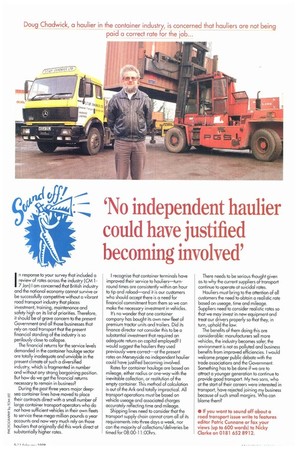Doug Chadwick, a haulier in the container industry, is concerned
Page 47

If you've noticed an error in this article please click here to report it so we can fix it.
that hauliers are not being paid a correct rate for the job...
'No independent haulier could have justified becoming involved'
In response to your survey that included a review of rates across the industry (CM 17 Jan) I am concerned that British industry and the national economy cannot survive or be successfully competitive without a vibrant road transport industry that places investment, training, maintenance and safety high on its list of priorities. Therefore, it should be of grave concern to the present Government and all those businesses that rely on road transport that the present financial standing of the industry is so perilously close to collapse.
The financial returns for the service levels demanded in the container haulage sector are totally inadequate and unviable in the present climate of such a diversified industry, which is fragmented in number and without any strong bargaining position. But how do we get the financial returns necessary to remain in business?
During the past three years major deep sea container lines have moved to place
their contracts direct with a small number of ,2 large container transport operators who do -8' not have sufficient vehicles in their own fleets ito service these mega-million pounds a year
accounts and now very much rely on those
62 hauliers that originally did this work direct at 1 substantially higher rates.
I recognise that container terminals have improved their service to hauliers—turnround times are consistently within an hour to tip and reload—and it is our customers who should accept there is a need for financial commitment from them so we can make the necessary investment in vehicles.
It's no wonder that one container company has bought its own new fleet of premium tractor units and trailers. Did its finance director not consider this to be a substantial investment that required an adequate return on capital employed? I would suggest the hauliers they used previously were correct—at the 'present rates on Merseyside no independent haulier could have justified becoming involved.
Rates for container haulage are based on mileage, either radius or one-way with the inevitable collection, or restitution of the empty container. This method of calculation is out of the Ark and totally impractical. All transport operations must be based on vehicle useage and associated charges accurately reflecting time and mileage. Shipping lines need to consider that the transport supply chain cannot cram all of its requirements into three days a week, nor can the majority of collections/deliveries be timed for 08:00-11:00hrs. There needs to be serious thought given as to why the current suppliers of transport continue to operate at suicidal rates. Hauliers must bring to the attention of all customers the need to obtain a realistic rate based on useage, time and mileage. Suppliers need to consider realistic rates so that we may invest in new equipment and treat our drivers properly so that they, in turn, uphold the law. The benefits of them doing this are considerable: manufacturers sell more vehicles, the industry becomes safer, the environment is not as polluted and business benefits from improved efficiencies. I would welcome proper public debate with the trade associations and the Government. Something has to be done if we are to attract a younger generation to continue to provide good transport. My two sons, who at the start of their careers were interested in transport, have rejected joining my business because of such small margins. Who can blame them?
• If you want to sound off about a road transport issue write to features editor Patric Cunnane or fax your views (up to 600 words) to Nicky Clarke on 0181 652 8912.








































































































